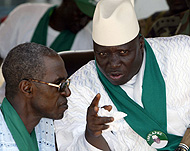Marbles put Gambian president ahead
Early counts, using a unique marble system, show that the Gambian president, who has been in power since he staged a coup 12 years ago, is on track for a third term.

Yahya Jammeh has won in 12 of the 48 voting regions to have reported provisional results from Friday’s presidential election, according to the results released by the country’s independent electoral commission.
In each of the regions, Jammeh had beaten his main rival, Ousainou Darboe, a prominent human rights lawyer.
Jammeh, 41, has been widely tipped to win a third five-year term due to a divided and ineffective opposition.
Vote counting started several hours after polling closed at about 6.30pm (1830 GMT) following a two-and-half-hour extension after heavy rains lashed the country, slowing the voting process.
Marble ballots
Balloting was through a unique half-a-century old process of dropping a transparent marble into coloured steel drums allotted to different candidates.
 |
|
Jammeh (R) says God has sent |
Counting the ballots is similarly unusual.
The marbles are emptied from the drums onto sieves to separate them from debris – especially sawdust or sand, placed at the bottom of the drum to protect the special glass marbles from hitting directly onto the hard floor of the heavy steel drums during balloting.
After that they are laid out onto counting trays – wooden boards engraved with either 200 or 500 holes fit for a single marble.
Trays are then taken round to all candidates’ agents, observers and media to see and numbers are totalled up.
“This makes counting faster,” a vote monitor told AFP during counting at one counting centre in Bakau town, an opposition stronghold near Banjul.
Observers said procedures had generally been followed on voting day.
“From what we have seen so far everything went on okay, voting started on time and turn out was reasonable,” Oumar Ndongo, leading observers from the Abuja-based West African Civil Society Forum, told AFP.